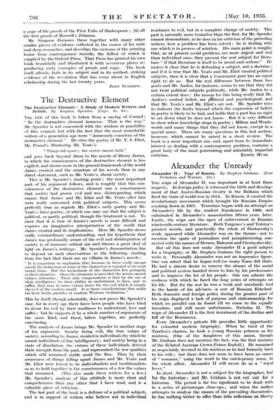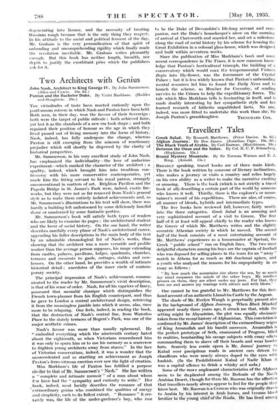Alexander the Unready
Alexander II: Tsar of Russia. By Stephen Graham. (Ivor Nicholson and Watson. 21s.)
THE reign of Alexander II. was important in at least three respeets. In foreign policy it witnessed the birth and develop- ment of that Austro-Russian rivalry in the Balkans which fired the train of world-war in 1914. In Russia, it created the revolutionary movement which brought the Russian Empire crashing down in 1917. Terrorism began with an attempt on Alexander's life by the student Iiarakozov in 1866, and culminated in Alexander's assassination fifteen years later. Lastly, the reign saw the apex of achievement in Russian nineteenth-century literature. Both Turgenev's and Tolstoy's greatest novels, and practically the whole -of Dostoevsky's work, appeared while Alexander was on the throne—not to mention the spate of journalism and pamphleteering con- nected with the names of Herzen, Bakunin and Chernyshevsky.
But all this does not make Alexander II a good subject for a biography, or Mr. Stephen Graham the right person to write it. Personally Alexander was not an impressive figure. One can admit that he began well (so many Tsars did that). He had a sincere desire to remove the abuses of the social and political system handed down to him by his predecessors and to improve the lot of his people. One can admire the coolness with which he faced the long series of attempts on his life. But for the rest he was a weak and unreliable tool in the hands of his advisers—a sort of Russian Ethelred. Both domestic and foreign policy during the greater part of his reign displayed a lack of purpose and statesmanship for which no parallel can be found till we come to the equally irresolute, and still more unfortunate, Nicholas II. The reign of Alexander II is the first instalment of the decline and fall of the RomanoVs.
Even Alexander's private life provides little opportunity for colourful modern biography. When he tired of the Tsaritsa's charms, he took a young Russian princess as his mistress. (One of the daughters of this union, though Mr. Graham does not mention the fact, was the first mistress of the ill-fated Austrian Crown-Prince Rudolf.) He remained as respectably devoted to his mistress as he had formerly been to his wife ; but there does not seem to have been an ounce of "romance," using the word in the catch-penny sense, in the whole affair. Alexander II will never do as a "royal lover."
In short, Alexander is not a subject for the biographer, but for the historian ; and Mr. Graham is not cut out foi a historian. The period is far too significant to be dealt with in a series of picturesque close-ups ; and when the author attempts to analyse the causes of the prevailing discontents, he has nothing better to offer than trite reflexions on liberty degenerating into licence, and the necessity of treating Russians tough because that is the only thing they respect. /n his attitude to the social and political ferment of the day, Mr. Graham is the very personification of that spirit of unbending and uncomprehending rigidity which fmally made the revolution inevitable. Mr. Graham writes pleasantly enough. But this book has neither length, breadth, nor depth to justify the exorbitant price which the publishers ask for it.



































































 Previous page
Previous page